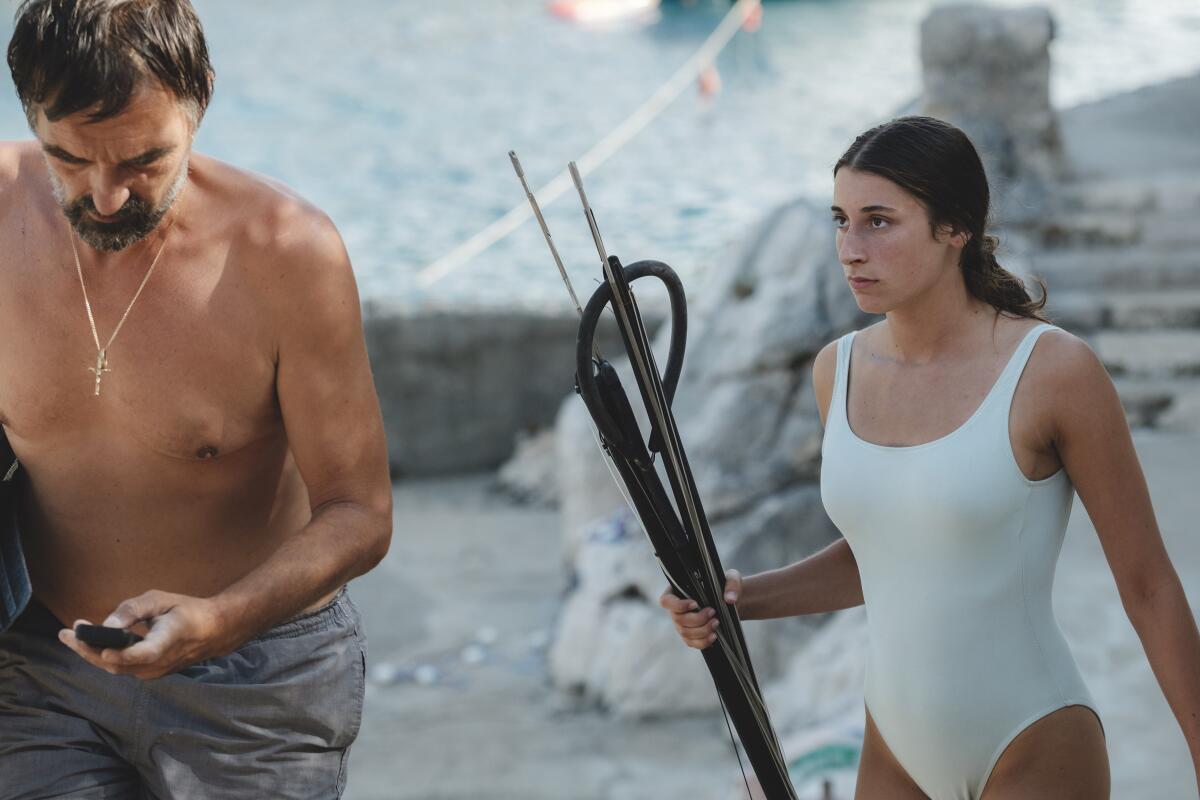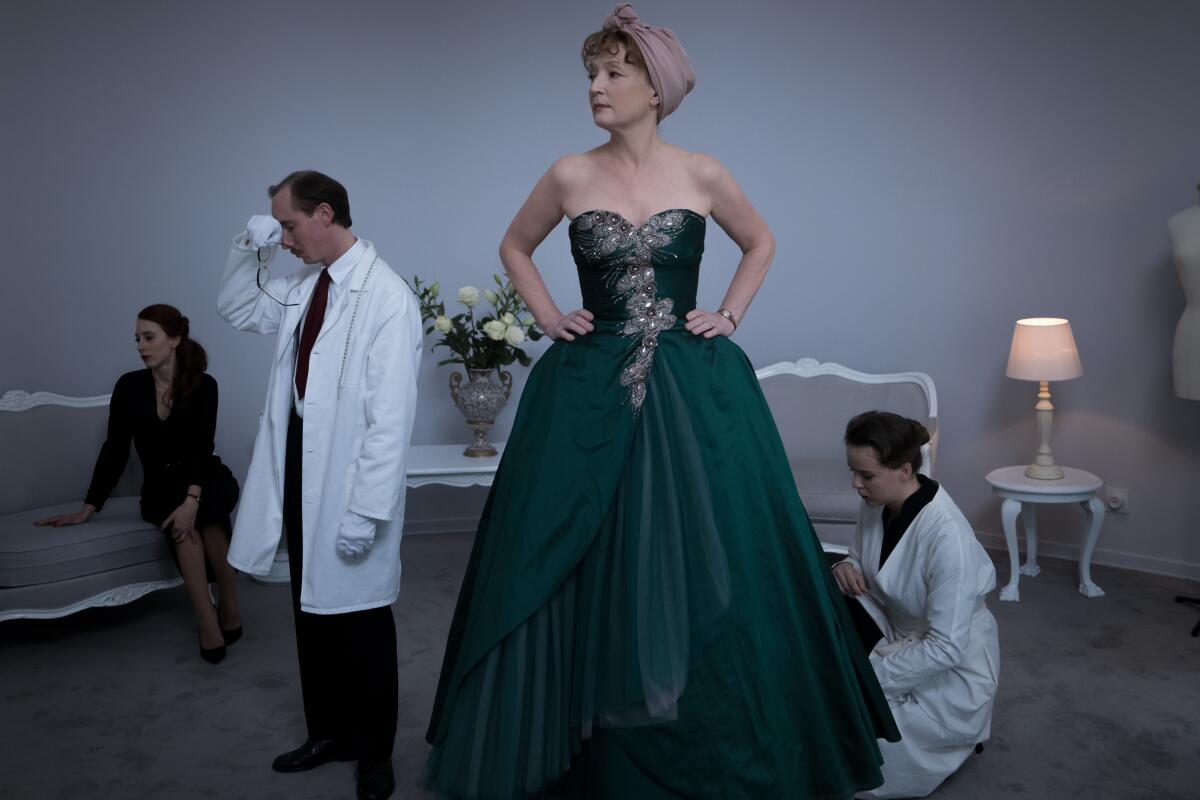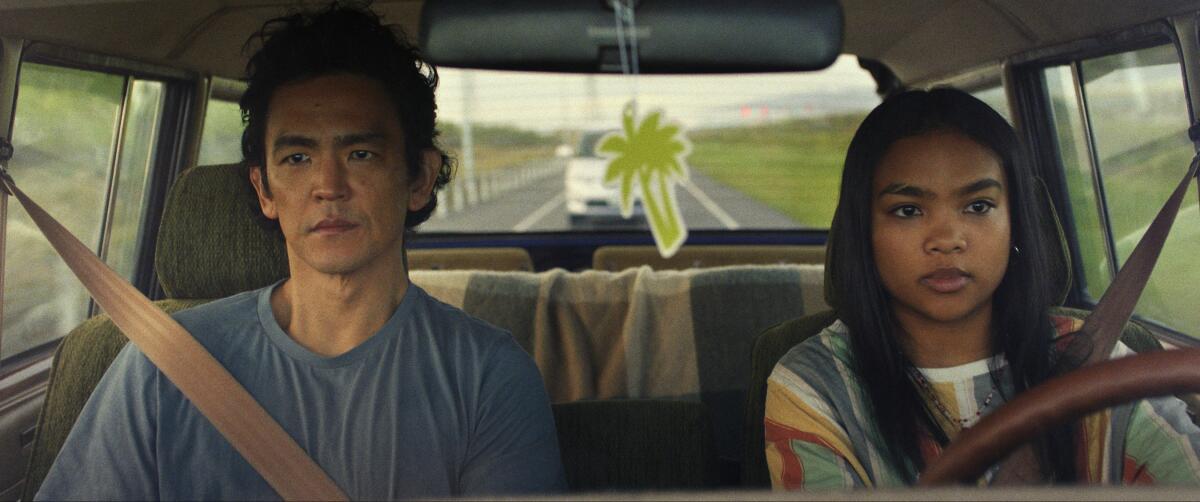A teenager breaks free in ‘Murina’

- Share via
Hello! I’m Mark Olsen. Welcome to another edition of your regular field guide to a world of Only Good Movies.
Only good movies
Get the Indie Focus newsletter, Mark Olsen's weekly guide to the world of cinema.
You may occasionally receive promotional content from the Los Angeles Times.
40 years of Outfest. Celebrating its 40th anniversary, Outfest — L.A.’s LGBTQ+ festival — began this week and runs through July 24. The festival opened with Billy Porter’s directorial debut, the coming-of-age romance “Anything’s Possible.” Among highlights of this year’s program will be a 20th anniversary screening of Todd Haynes’ “Far From Heaven” in 35 mm, with star Julianne Moore in attendance, and a preview of the upcoming series adaptation of “A League of Their Own.” The festival will close with the premiere of “They/Them,” a thriller that marks the directing debut of screenwriter John Logan.
Nicolas Cage Day (Unofficial). In what is apparently a complete coincidence, two venues will play top-grade Nicolas Cage films on Sunday, making the day an unofficial celebration of the actor. The New Beverly — in a double bill programmed by Cage himself — will have 35-mm screenings of Martin Scorsese’s undersung “Bringing Out the Dead,” written by Paul Schrader, and John Dahl’s crucial ’90s neo-noir “Red Rock West.” The Academy Museum screens John Woo’s ecstatic “Face/Off” in 35 mm in the big room at the David Geffen Theater with an introduction from screenwriters Mike Werb and Michael Colleary.
Rivette’s “Duelle” revisited. The Mezzanine screening series hosts the L.A. premiere of a 2K restoration of Jacques Rivette’s 1976 film “Duelle” at the 2220 Arts + Archives space on Thursday, July 21. With an introduction from critic and programmer Miriam Bale, the event will bring to local audiences another of Rivette’s uncanny metaphysical explorations, this time starring Juliet Berto and Bulle Ogier as rival goddesses making their way through Paris.
“My Old School” screening. On Wednesday, July 20, we will host an in-person Indie Focus screening series event for the new documentary “My Old School.” Following a showing of the film, director Jono McLeod will join us for a Q&A.
Enjoying this newsletter? Consider subscribing to the Los Angeles Times
Your support helps us deliver the news that matters most. Become a subscriber.
‘Murina’
The directorial debut for Antoneta Alamat Kusijanović, “Murina” won the Caméra d’Or prize for best first film when it premiered at the 2021 Cannes Film Festival. Shot by celebrated cinematographer Hélène Louvart and executive produced by Martin Scorsese, the film tells the story of teenage Julija (Gracija Filipović), yearning to break free from her controlling father and life in their small Croatian coastal town. The movie is playing in limited release.
For The Times, Justin Chang wrote, “At times overpowering in its sun-drenched sense of place, ‘Murina’ reveals each corner of this private world to us with a cool, dispassionate gaze. … [Julija’s] dream of escape may well be a delusion; Javier, for all the promise he represents, is at best a knight in tarnished armor, as well as a man with burdens and anxieties of his own. But it’s a dream that Kusijanović embraces alongside her heroine, notably in a sequence of Julija swimming in open water, the camera bobbing gently in front of her for a few moments before rising to a breathtaking bird’s-eye view. It’s a bracing image of freedom in a world that, even if only for a few moments, finally feels like paradise.”
For the New York Times, Manohla Dargis wrote, “The writer-director Antoneta Alamat Kusijanović uses dialogue prudently, keeping exposition to a minimum and letting details trickle in through naturalistic conversations and in the feelings that tremble in every exchange. Why is everyone angry? Patriarchy? Teenagers? Take your pick. Kusijanović, making her feature directing debut, plots the family’s dynamic through a roundelay of gazes and with near-geometric precision. … For the most part, the director cuts loose her characters and lets them and the story’s vague ideas — about gender, sexuality, money and power — swirl and drift, leaving you to decide how and whether they all fit together, or don’t.”
For Vulture, Bilge Ebiri wrote, “The settings of ‘Murina’ are certainly lovely, but Kusijanović avoids the siren call of the picturesque. The sea is steel blue, the terrain arid and lunar; the landscape has been stripped of possibility. Even the expertly-shot underwater sequences have a strange, surreal desolation to them; only those haunted, serpentine morays seem to exist in this barren blue world. (We see almost no other fish.) The daughter’s dreams cannot be contained by this spare coastline, while the father’s dreams have curdled here into empty grandiosity. The whole place is suffocated of life. And yet, somehow, the picture itself is wonderfully alive.”
For Reverse Shot, Ela Bittencourt wrote, “Despite its essentially polemical, feminist nature, ‘Murina’ can be surprisingly understated, leaving viewers ample room to breathe. … And though Kusijanović doesn’t suggest a clear way out of Julija’s entrapment, her young heroine has already done something therapeutic. While she has lashed out to no avail, it’s true, she’s also tested the boundaries of her relationship with powerful men — the limits of her reliance on them, as well as the limits of her allegiance to womanhood as placidly set out by her mother.”

‘Mrs. Harris Goes To Paris’
Directed by Anthony Fabian from the novel by Paul Gallico, “Mrs. Harris Goes to Paris” is a whimsically delightful tale of fashion and finding oneself. The movie stars Lesley Manville as Ada Harris, a widowed housecleaner in 1950s London who decides she simply must have a couture Dior gown and goes on quite the journey to get it. The supporting cast includes Isabelle Huppert, Lambert Wilson, Alba Baptista, Lucas Bravo and Jason Isaacs. The movie is playing in theaters in general release.
Emily Zemler spoke to Manville, Fabian and Huppert about the movie. Of it’s sneaky, light tone, Manville said, ““It’s meant to make you feel good. It’s meant to make you feel that the world is all right when the world is really not all right at the moment. It’s just a heartwarming story about this little Duracell battery of a woman who has got this notion in her head that why shouldn’t she have a dress? She’s a woman. She’s feminine. She wants to feel lovely. And why can’t it be something that this cleaner can have?”
For Tribune News Service, Katie Walsh wrote, “One could say that frittering away money on an expensive dress wouldn’t be worth it, but one would be revealing themselves as not knowing the real power of real fashion; that often looking good means feeling good, and feeling good means knowing, and demanding your own worth. This is the message of ‘Mrs. Harris Goes to Paris,’ which boasts a proud pro-labor sentiment, starting with Mrs. Harris, whose adventure across the English Channel helps her to see herself as someone worth being seen, someone deserving of nice things.”
For the Washington Post, Ann Hornaday wrote, “Hovering over ‘Mrs. Harris Goes to Paris’ is a character from another movie entirely: Cyril, the martinet-like sister Manville played in 2017’s fashion-centric melodrama ‘Phantom Thread.’ … Manville in any incarnation is one of the great pleasures of screen storytelling, especially now. And even at its most patronizing, ‘Mrs. Harris Goes to Paris’ provides a generous, gentle stage for her most endearing qualities to shine through. There are moments when ‘Mrs. Harris Goes to Paris’ resembles the cinematic equivalent of nursery food: over-egged but soothing, and perhaps a much-needed respite from a world in danger of spinning off its axis.”
For Vanity Fair, Richard Lawson wrote, “Manville shrewdly draws a working class hero who is neither supernaturally good nor saintly in her humble penury. She’s just a regular lady who wishes to do an irregular thing, and so she does. … It’s lovely to see someone of Manville’s stature treat this airy lark so thoughtfully; she guides ‘Mrs. Harris’ toward a genuinely poignant conclusion, one in which the Euro fantasy fades but a more sustainable, more local contentment begins to bloom. Not so much a testament to conspicuous consumption as it is to the necessity of occasionally shaking up the routine of one’s life, ‘Mrs. Harris Goes to Paris’ is a nourishing, if fleeting, summer holiday that can be enjoyed for far less than the cost of couture.”

‘Don’t Make Me Go’
Directed by Hannah Marks from a script by Vera Herbert, “Don’t Make Me Go” is a father-daughter road-trip dramedy anchored by the performances of John Cho and Mia Isaac. Single father Max (Cho) takes his daughter, Wally (Isaac), on a cross-country drive to his high school reunion, though he has other motivations in mind. The film is streaming on Prime Video.
For The Times, Sarah-Tai Black wrote, “A keen student of millennial women filmmakers such as Greta Gerwig and Lena Dunham, actor and filmmaker Hannah Marks similarly imbues her movies with equal dashes of frustration, melancholy and humor; her latest feature, ‘Don’t Make Me Go,’ is no exception to this. … While every director shouldn’t be tasked with reinventing the cinematic wheel (most every movie has its place and audience), there is something about a movie like ‘Don’t Make Me Go’ that — even as it pulls on your heartstrings or makes you smile — still leaves one feeling uninspired.”
For the New York Times, Amy Nicholson wrote, “The setup is like a hazard sign reading ‘Caution: Treacle Ahead.’ Yet the director Hannah Marks and the screenwriter Vera Herbert veer from predictability. Life is unpredictable, and the film gambles big to make that point. … Cho and Isaac’s stellar performances expose the gulf between familiarity and intimacy. The two flinty characters are more likely to expose their own vulnerable bellies to outsiders than to each other. Herbert’s droll, scrupulously realistic dialogue captures the journey of a parent and a child learning to see each other as flawed people.”
For the Hollywood Reporter, Angie Han wrote, “With Max growing more complicated while Wally does not, ‘Don’t Make Me Go’ starts to look like nothing so much as an exaggerated fantasy of parenthood. … When Max’s secrets inevitably come tumbling out, the ensuing confrontation sounds less like an emotional outburst between a teenager and her dad, and more like a parent’s fantasy of all the frustrations they’ve imagined expressing to their kid, and all the sentimentalities they wish they’d hear back in turn.”
For IndieWire, Kate Erbland wrote, “From its opening moments, Hannah Marks’ ‘Don’t Make Me Go’ tries to put its audience at ease with a surprising promise: disappointment. ‘You’re not going to like the way this story ends, but I think you’re going to like this story,’ young Wally Park (newbie Mia Isaac) tells us via voiceover. … And it will prove to be true: ‘Don’t Make Me Go’ is a sweet, charming, and eventually daring dramedy with tons of heart. Also true: Where this road trip movie ends its journey will likely engender some very strong reactions, but Vera Herbert’s smart script (a Black List entry), Marks’ assured direction, and the delight of Cho and Isaac’s well-matched performances sell it. It stings, but we knew that. Wally told us already, but it’s up to the audience to believe her.”

Only good movies
Get the Indie Focus newsletter, Mark Olsen's weekly guide to the world of cinema.
You may occasionally receive promotional content from the Los Angeles Times.




